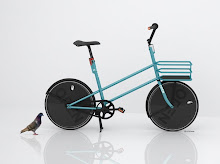In the August 2012 Governing, which describes itself as "... the nation's leading media platform covering politics, policy and management for state and local government leaders", Regional Plan Association Senior Fellow Alex Marshall gets it wrong about what makes cycling safe in the Netherlands (and Continental Europe).
In his story in Governing, Marshall praises "strict liability" in the Netherlands (and elsewhere in Continental Europe), claiming that "... it’s not the bike lanes that keep cyclists safe..." but that "Ultimately, if we are to be safe, we need the driver to look out for us, not for us to look out for the driver."
Marshall gives the following description of "strict liability": "It means that if you, the driver, strike a pedestrian or cyclist, you are automatically at fault, even if the walker or cyclist literally jumps out in front of you. "
Marshall thinks that "Strict liability" is a kind of Commandment - learned, or even genetic - that governs the behavior of drivers (and cyclists towards pedestrians) and that it is the primary method for keeping cyclists (and pedestrians) safe in the Netherlands. This is simply not the case, but to be fair to Marshall lots of people get this wrong (hugs).
Fortunately, two of the three leading bloggers* of Dutch cycling education, David Hembrow and Marc Wagenbuur, describe the reality here in a comprehensive blogpost from the beginning of this year, "Campaign for Sustainable Safety, not Strict Liability". I won't excerpt it so it does not get misunderstood (!), so please read it now, in its entirety.
I agree that drivers in the USA have much less legal liability then they should, and am happy that groups like Transportation Alternatives in NYC have lately become emboldened to take on the NYPD (and Mayor Michael Bloomberg) and their inability or unwillingness to enforce current laws in a new campaign and recent report, but am frustrated that senior experts like Marshall believe more than anything in repercussion-based mobility safety. However, I am sure that they are willing to learn what really works!
* The other leading Netherlands-based blogger is Marc van Woudenberg, who also produced this introduction video for the Dutch Cycling Embassy, the "... portal to Dutch expertise on cycling".





6 comments:
You are so incredibly right!
Best wishes from Stockholm
Rupert
You are right. Even we Dutch tend to misinterpret this article of law. It is not very important in Dutch society. People tend to think that it means car drivers are automatically at fault when hitting a cyclist. That's not the case; it's not about who's to blame, but about whose insurance is going to pay for the damage. That being said, this law is not the reason my driving keeps cyclists safe (or the other way around, for I am both). It definitely is the infrastucture. I don't drive around feeling anxious about the repercussions of hitting a cyclist. (on the other hand, if it WERE so, it might make motorist activists for better cycling provisions.... :D)
You are right on target here, but as a long time cyclist, I can't help but smile as I think, no, dream of a world where motorists drive like frightened children, under the fear of strict liability. How nice it would be if all motorists actually drove like they were not the ONLY people on the road....
I disagree. To emphasise that laws don't matter is comedy. If Europeans don't think about strict liability, it doesn't mean it doesn't matter. It might simply mean that the law reflects the will of the people.
Attitudes matter. Citizens will feel that motorists have a larger responsibility than pedestrians and cyclists, and decision makers will feel it's a good thing to accomodate cyclists and pedestrians. These attitudes, especially among decision makers, are influenced by the laws that govern their work.
Compare strict liability with the common attitude that bikes don't belong on the road. What country besides the USA feels the need for signs saying "share the road"?
I have to say, the Dutch duo you cite suffer from a severe case of "not invented here". The Dutch are the best, but there are lots of exciting things going on all around the world like bike share, bike counters and celebrities talking bikes.
Bike paths are not the only ingredient. Copenhagen's infrastructure is not that much better than here in Sweden but their mode share is double or triple. I would even say the Swedish bike paths on the whole are even more separated than the Copenhagen ones, which merge right-turning motor traffic with cyclists.
Erik, who is saying that laws don't matter?
Okay, I replied too quickly. I agree that bike infrastructure is more important that strict liability. Alex Marshall has it backwards, you're right about that.
Who is saying that laws don't matter? Well, on one of your links it says "Strict Liability has, at best, a very small role to play in keeping cyclists in the Netherlands safe." The post pours cold water on the concept at length.
One thing I like about strict liability is that it encourages people to just get out there on their bikes. Sweden has lots of bike paths, not as nice as in The Netherlands but perfectly usable. But even though 50% of the population lives within 5 km of work (20 minutes by bicycle), over 90% of journeys are not done by bicycle. So if there's a bike path almost the whole way to work, people will complain about the small gaps that remain.
A good example is this film in which problems 2-4 are relatively minor but presented as deal-breakers. The infrastructure in Copenhagen is not hugely different but people cycle three times as much there. They just do it.
In northern Europe I think we need to differentiate between cycle safety and cycle attractiveness. Most of the sites in the film above are not dangerous for cycling, especially for adults with driver's licenses. But they could be made much more attractive to cycling. By failing to make the distinction, cycling in northern Europe is portrayed as dangerous when it really isn't.
I think a public discussion about strict liability would go some way to make people feel they have a right to cycle on the roads where there are gaps in the cycle path network. There's an unfortunate idea that roads are for cars and that they can't slow down. For those who can't slow down, I suggest taking the train or flying.
Post a Comment